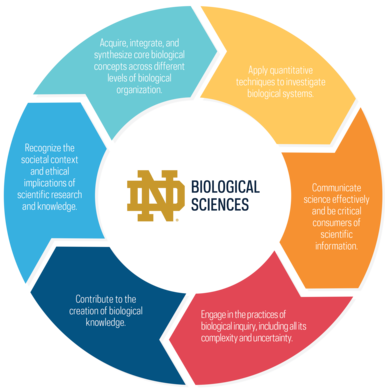Introductory Biology
Introductory Biology at Notre Dame
The sequence of introductory courses is designed to help you gain conceptual knowledge in biology and learn how to think like a biologist. The sequence of courses consists of two lecture courses, Big Questions and Molecules to Ecosystems, and two laboratory courses, Biological Investigations and Research Experience in Biology.
Together the four courses are designed to help you meet the following learning objectives:
- Acquire, integrate and synthesize core biological concepts across different levels of biological organization.
- Engage in the practices of biological inquiry, including all its complexity and uncertainty.
- Apply quantitative techniques to investigate biological systems.
- Contribute to the creation of biological knowledge.
- Communicate science effectively and be critical consumers of scientific information.
- Recognize the societal context and ethical implications of scientific knowledge.
FALL SEMESTER
BIOS 10171 - Biology I: Big Questions (3 credits)
This course will provide an opportunity for you to learn biology while engaging with a “big question”, such as climate change, infectious disease, or cancer. Big Questions uses an integrated approach to thinking about biology that will provide a strong scaffold to support your learning of biological concepts in future courses.
The course consists of a selection of eight Big Questions modules led by a professor who is an expert in the field. Following your first week in the course, you will register for two half-semester modules. The module selection process will be optimized to help match your interests and maintain reasonably small class sizes. Though the “big question” will differ between modules, all modules will address similar core biological concepts and will emphasize the skills of scientific practice. All modules meet at the same time, and the class size of each will be approximately 70 students.
Fall 2023 Big Questions Modules:
- Does Morality Have a Biological Basis? (Dr. Elizabeth Archie)
- Will Gene Editing Change the World? (Dr. Patricia Champion)
- Genetic Variation, Identity and Health: Am I my DNA? (Dr. Hope Hollocher)
- Blindness: Can We See Potential Gene and Stem Cell Therapies? (Dr. David Hyde)
- Hero or Villian: How Might Earth's Ecosystem Resolve the Climate Question? (Dr. David Medvigy)
- How Will Studying Biology Equip You to Fight the Next Pandemic? (Dr. Alex Perkins)
- Humans: How Did We Get Here, and Why Are We Like This? (Dr. Michael Pfrender)
- Natural Selection: The Reason Why We Haven't Cured Cancer? (Dr. Zachary Schafer)
BIOS 11173 - Biological Investigations Laboratory (1 credit)
This course will provide an opportunity to develop fundamental research skills used in the study of biological systems. The overall goal of this course is to help you learn to “think like a biologist”, while developing a “toolbox” of techniques that can be applied to current research questions in biology. In this course, you will acquire specific technical skills, develop a logical and systematic approach to designing and conducting experiments, and learn to communicate the results of experiments.
Previous Fall laboratory projects have included:
- Fieldwork and diversity indices
- Polymerase chain reaction (PCR) and DNA barcoding
- Bacterial transformation and molecular reporter systems
- Mathematical modeling of biological systems

SPRING SEMESTER
BIOS 10172 - Biology II: Molecules to Ecosystems (3 credits)
This course is designed to be a complement to Big Questions, and will provide an opportunity to master and integrate core biological concepts across all levels of biological organization. Throughout the course you will be challenged to make connections among these concepts and apply them to your own biological questions.
Molecules to Ecosystems will be organized around five major themes in biology including: evolution of organisms, flow of biological information, relationships between structure and function, metabolism and the transformation of matter and energy, and homeostasis in biological systems. The activities and assessments in this course will focus on conceptual fluency of core biological processes, rather than memorization, and will help you develop skills in problem-solving and critical thinking. All students completing the course in good standing should be well-prepared to transfer core concepts to upper division courses in biology, or to apply these concepts to their field of study. Sections of approximately 70 students will be offered by various faculty, but will all use a common course outline and assessments.
BIOS 11174 - Research Experience in Biology Laboratory (1 credit)
This course will allow you to apply your biological research skills to a semester-long authentic research project. Laboratory projects are linked to the current research of a Notre Dame faculty member. Over the semester, you will be given an authentic experience of actually “doing” biology, which will allow to you further develop your skills in technical protocols, experimental design and analysis, and scientific communication.
Several options for research projects will be offered in specific sections of the course. All of the research projects will provide an opportunity to contribute to the creation of biological knowledge, and will use the same number and types of assessments. The semester will culminate with a course-wide research symposium in which you and your team will present the results of your research endeavors.
Current Spring research projects include:
- Protein-DNA interactions in the ESX-1 secretion system of M. tuberculosis. (Lab professor: B. Rudenga; Research PI: P. Champion)
- Evolutionary responses of salt marshes to global environmental change. (Lab professor: T.M. Olsen; Research PI: J. McLachlan)
- From phenotype to genotype: Daphnia, mutagenesis, and a whole lotta’ gene expression (Lab professor: T. Agrelius; Research PI: M. Pfrender)
